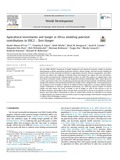Agricultural Investments and Hunger in Africa Modelling Potential Contributions to SDG 2 - Zero Hunger
Date
2018-12-01Author
Mason-D'Croz, Daniel
Sulser, Timothy B.
Wiebe, Keith
Rosegrant, Mark
Lowder, Sarah K.
Nin-Pratt, Alejandro
Willenbockel, Dirk
Robinson, Sherman
Zhu, Tingju
Cenacchi, Nicola
Dunston, Shahnila
Robertson, Richard D.
Metadata
Show full item recordImpact
Abstract
We use IFPRI’s IMPACT framework of linked biophysical and structural economic models to examine
developments in global agricultural production systems, climate change, and food security. Building on
related work on how increased investment in agricultural research, resource management, and infrastructure can address the challenges of meeting future food demand, we explore the costs and implications of these investments for reducing hunger in Africa by 2030. This analysis is coupled with a new
investment estimation model, based on the perpetual inventory methodology (PIM), which allows for
a better assessment of the costs of achieving projected agricultural improvements. We find that climate
change will continue to slow projected reductions in hunger in the coming decades—increasing the number
of people at risk of hunger in 2030 by 16 million in Africa compared to a scenario without climate
change. Investments to increase agricultural productivity can offset the adverse impacts of climate
change and help reduce the share of people at risk of hunger in 2030 to five percent or less in
Northern, Western, and Southern Africa, but the share is projected to remain at ten percent or more in
Eastern and Central Africa. Investments in Africa to achieve these results are estimated to cost about
15 billion USD per year between 2015 and 2030, as part of a larger package of investments costing around
52 billion USD in developing countries.
Citation
Mason-D’Croz, D.; Sulser, T.B.; Wiebe K.; Rosegrant, M.W.; Lowder, S.K.;Nin-Pratt, A.; Willenbockel, D.; Robinson, S.; Zhu, T.; Cenacchi, N.; Dunston, S.and Robertson, R.D. (2019) 'Agricultural Investments and Hunger in Africa Modelling Potential Contributions to SDG 2 - Zero Hunger,' World Development Volume 116, April 2019, Pages 38-53DOI
10.1016/j.worlddev.2018.12.006Is part of series
World Development;Volume 116, April 2019Rights holder
© 2018 The Authors. Published by Elsevier Ltd.Rights details
http://creativecommons.org/licenses/by/4.0/Collections
- Journal Articles - External [429]
- IDS Research [1671]


